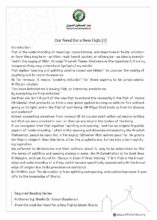
To download the complete study: here
Introduction:
Women account for 49.4% of the population in Syria, representing almost half. Therefore, it’s crucial to explore their issues since they impact the structure of Syrian society, either positively or negatively. Hence, at the Family Office / Department of Research and Studies, we deemed it essential to highlight this critical issue. Marital life is not temporary or conditional, but ideally, it should be long-lasting with the purpose of forming a family and building a household. There’s a saying: “What’s built on falsehood inevitably collapses.”
A Regressive Reality:
Undoubtedly, most of the Syrian society is currently transitioning from a primitive phase of civil life. By “civil,” I don’t mean the distinction between urban and rural areas, but rather a modern way of thinking based on essential human rights principles, their application, and not compromising on them.
The Syrian regime is arguably responsible for not progressing in the protection of women’s rights. For example, when Legislative Decree No. 333 was issued on September 26, 2002, declaring Syria’s accession to the “CEDAW” convention aiming to eliminate all forms of discrimination against women, the Syrian regime had reservations about the treaty, dashing any hope for Syrian women to benefit from the convention, especially legally.
Alarming Rates:
We conducted a quick and random census at the beginning of this year 2023 in three Syrian areas: Idlib governorate – the city, Baniyas city, and Raqqa city. The target group consisted of couples where neither spouse had achieved secondary education. The census included 48 families, and the women were interviewed directly or indirectly through social media. The table below summarizes this census:
* Questioning the woman by her family about accepting her husband:
– Asked: 70%
– Not Asked: 30%
* The woman’s consent after being asked:
– Consented: 45%
– Did Not Consent: 55%
* Effect of her refusal on the marriage:
– Marriage was annulled: 37%
– Married despite refusal: 63%
* The woman’s stance on being married against her will:
– Resisted: None
– Did Not Resist: 100%
Thus, a quarter of the women in Syria are forced into marriages against their will. As a result, they live their lives under duress from the beginning.
The Dangers of Forced Marriage:
Forcing a woman into marriage directly leads to the destruction of the entire society. In a specific discussion (to gauge public opinion) with one of the well-informed dignitaries in “Al-Bab” city in Syria, it was revealed that interventions by community leaders to rectify problematic marital relations occur almost daily, for various reasons. Often, the primary cause is the coercion into marriage from the beginning. After which, problems multiply, especially after having children, making discussions almost impossible. We might need a special study addressing childbirth and the importance of patience until a sound foundation is established between the couple.
Consequences of forcing a woman into marriage:
1. Psychological and emotional distress, living in unhealthy conditions like depression, tension, and anxiety. This can lead to complete dissatisfaction with marital life, causing family disintegration, not to mention the negative effects on child-rearing.
2. Marital infidelity. If the wife rejects her husband, it may prompt him to seek another partner, even illicitly, illegally, or unethically. Unfortunately, there are no statistics on this issue because Middle Eastern women generally refrain from discussing it, even though many societal incidents indicate its occurrence.
3. Negative implications for child-rearing, upbringing, and guidance. The relationship between spouses directly affects their surrounding environment, often in a harmful way.
Conclusion:
Religions prohibit any form of forcing a woman into marriage. Many studies discuss the religious stance on this issue, its dangers, and its explicit rejection. The Syrian Future Movement, in its essence, refuses the idea of a man living with a woman who does not love or accept him. The most pressing question then arises: Why has the rate of forced marriages increased in our society today?
1. The rise in the rate of child marriages involving girls under 15.
2. The poverty sweeping our society due to war consequences, its longevity, the spread of ignorance, the scarcity of education, and, most alarmingly, the presence of a cover (due to religious ignorance) that legitimates such practices in some communities.
Recommendations:
From our perspective on Syria’s future, we recommend:
1. Not to be lenient on the issue of forced marriage and to direct the media, religious, academic, and psychological figures to highlight the importance of eradicating this dangerous and destructive phenomenon.
2. Elevate the level of education and encourage learning in marginalized societies, guiding generations about its dangers and implications.
3. Control the idea of early marriage until women, alongside their peers, reach a stage of discernment and awareness in their society.
4. Socially criminalize this (as an initial step) until courts consider and legally penalize it.
Iman Al-Mohammad
Research and Studies Department
Scientific Office
Syrian Future Movement
[1] سكان سوريا (2023) يعيشون — Countrymeters
[2] مقال قانوني مميز عن المرأة في التشريعات السورية 2023 (mohamah.net)
[3] الاضطرابات النفسية (who.int)
[4] يُراجع: “أثر الإكراه في الزواج والطلاق”, د. أحمد مصطفى القضاة. وانظر دراسة: طه صالح خلف حميد الجبوري: الإكراه على الزواج دراسة مقارنة.






